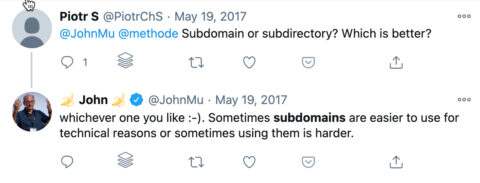I’m about to tell you an SEO fact that will answer so many questions about how Google operates that I can’t even cover them all in this article.
It’s also a great way to stir up debate in your finer SEO discussion forums.
Google ranks webpages, not websites.
Don’t believe me? Ask John Mueller of Google (I did):

Don’t believe John Mueller or Google?
Well, that’s a whole different discussion, but luckily, there have been many, many, many others who have stated the same thing.
Google ranks webpages, not websites.
Once you consider the power of this seemingly unassuming statement, you’ll see how keeping it in mind while you’re developing your organic search strategy can simplify many of your decisions.
Plus, it puts an end to many of the more popular SEO debates we’ve all suffered over the years.
What Does It Really Mean?
Look, we don’t need to overcomplicate this here, but let’s dive into how this phrase shakes things up and sometimes really upsets some of my fellow SEO pros.
Basically, “Google ranks webpages, not websites,” means that Google treats every webpage that its robots crawl and index like its own little self-contained world of content, code, and links.
While other webpages influence that world, where this world resides in the greater galaxy doesn’t matter to Google.
Therefore, as far as ranking and indexing go, that webpage could live on any domain it likes, and Google would treat it the same way.
I would try and make a Superman/Bottle City of Kandor reference here, but it would probably take over the whole discussion.
Moving on.
Why do some SEO pros hate this seemingly innocent phrase?
Because its existence breaks many concepts they hold dear – and because their business depends on people believing that these concepts of theirs exist.
Let’s not focus too much on that side of things.
Instead, we’ll look at how this idea explains so much about how we know ranking on Google works.
I’ve never had much use for the phrases “on-page” or “off-page” SEO, or “technical SEO” for that matter, so let’s break this down into three areas I use for my SEO audits (and much more): Content, Webpage Design, and Authority (Links).
Content
While I was writing this article, I received an Ask to Answer from Quora that lines up with the “Google ranks webpages, not web sites,” concept when it comes to the Content area of SEO: “Can blogging about different topics in the same blog harm my ranking?”
It’s a good question. I’ve even seen one of the best SEO professionals in the world ask something similar to his Facebook friends.
When I brought up “webpages, not websites” in my answer, it pretty much ended the discussion.
Every day, you probably read some of the best examples of why blogging (or any other writing for publication on the web) about different topics doesn’t damage your Google ranking: news websites.
Dozens of topics, living in harmony on the same domain, without doing a bit of damage to each other.
Why?
Google ranks webpages, not websites.
If you think about it, we wouldn’t want to live in a world where Google ranked webpages based on a single topic of the entire website.
As Joshua Hardwick of Ahrefs once explained,
“Just because your business makes stained glass windows doesn’t mean that every page on your site should rank for the query, ‘stained glass windows.'”
Webpage Design
If you’ve been in the search engine optimization game for any length of time, you’ve probably heard the whole “subdomain versus subfolder” debate at least once. I swear it bubbles to the top of the pot of SEO discussion ideas about once every couple of years.
Every year, Google clarifies. It doesn’t matter.

Why doesn’t it matter?
Because Google ranks webpages and not websites; therefore, those webpages can live on either a subdomain or a subfolder, and Google would treat them the same way.
Once again, we don’t want to live in a world where the mistakes of one page on your website drags down the entire site.
For instance, you’ve most likely encountered cases where one of your webpages is slower than all the rest of your pages.
This single page doesn’t drag down your entire website, just that one page.
Authority
One of the more popular and effective SEO strategies around these days is Content Hubs. The process, also known as the Pillar-Cluster Model, is based on the idea of creating a “hub” or “pillar” topic that links to other subpages or “clusters” of subtopics that provide greater detail on the hub/pillar content.
One of the reasons why this strategy works so well is because it allows for an easy method to pass the authority acquired from inbound links to your main topic hubs to the subtopics (or vice versa).
Why does it work so well?
Don’t make me write it again. Google will think I’m keyword stuffing.
While those internal links may not be as powerful as the external links, they still possess a lot of power because Google sees them all as individual pages with their own authority.
Occasionally, I’ll see someone claim that this content strategy also helps create an overall “topical authority” for your entire website but given the whole “webpage, not website” rule confirmed by Google, we know this isn’t true.
This brings us to the concept of an overall authority for your entire website, or domain if you will.
While some SEO tool companies have made a name for themselves pushing this concept, Google will be the first to tell you that it simply doesn’t exist.
Now, you may ask: if this website-wide authority metric doesn’t exist, why do spammy link building strategies like “Parasite Hosting” work so well?
Because it doesn’t work.
Parasite hosting is when a link builder sells a link from content buried on a well-known, usually educational website.
However, the only measure that this “hack” is effective is a domain-level authority metric influenced by other domains with a high domain-level metric, not actual ranking changes.
“Webpages, not websites” reveals an entire sub-economy of the SEO trade based on an utterly untrue concept.
Don’t waste your money trying to change a metric that only has value to people trying to sell that metric to others.
Conclusion
Some members of the SEO community love to point to Occam’s razor as to why their unsubstantiated theory based on insufficient data and sloppy statistics proves the existence of a ranking signal based on the collective behavior of the entire website – “the simplest explanation is usually the right one!”
Ironically, an even simpler answer explains why their theory doesn’t hold up to scrutiny.
I’m not the first to say that Google ranks webpages, not websites, and I doubt I’ll be the last.
Hopefully, now that you know better, you’ll join me in this mantra that answers so many SEO questions.
More Resources:


